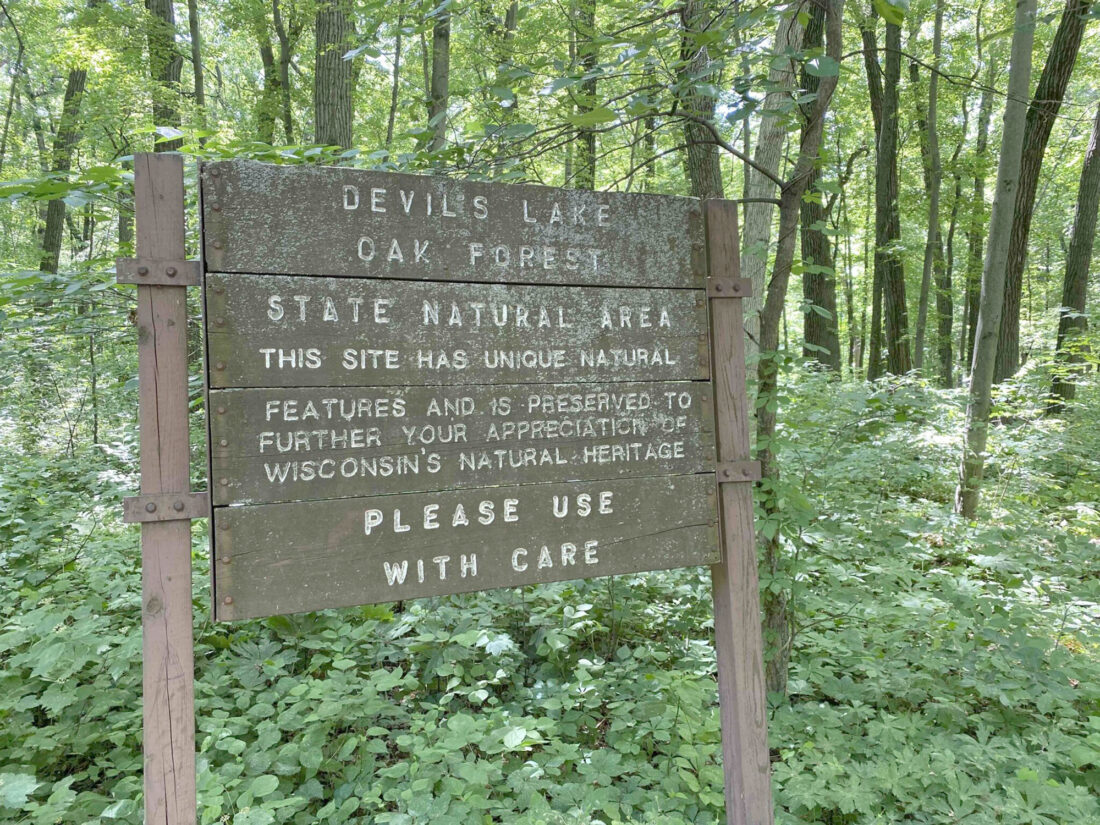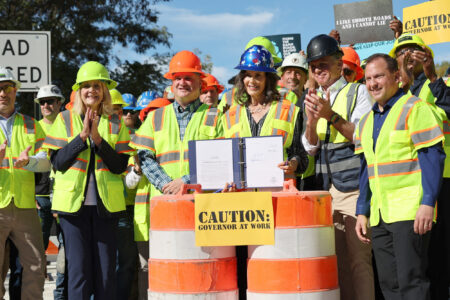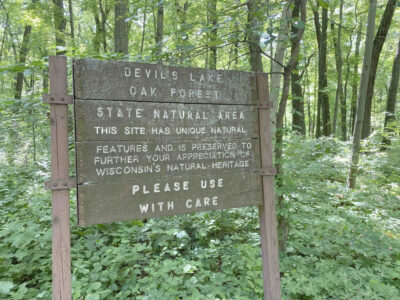Wisconsin Assembly Dems offer bills for ‘rights of nature’ and reinstitute mining law

A bill Wisconsin Assembly Democrats introduced Monday would grant Devil’s Lake State Park the rights to “flourish, evolve, and be clean.” (Henry Redman/Wisconsin Examiner)
To celebrate Indigenous People’s Day, Democrats in the Wisconsin Assembly announced a package of bills Monday that would grant rights to Devil’s Lake State Park and reinstitute a law that effectively banned mining.
The proposal to grant “rights of nature” to Wisconsin’s most popular state park comes just months after a group of Republicans introduced legislation that would prevent local governments in the state from enacting similar legislation. The Milwaukee County Board passed a rights of nature resolution promising to protect the Menominee, Milwaukee and Fox rivers and Lake Michigan. The Green Bay city council is also currently working on a rights of nature resolution.
Under the bill, Devil’s Lake has the right to “flourish, evolve, and be clean.” The bill gives the state attorney general the authority to enforce the law against people who infringe on the park’s rights and allows anyone to sue or intervene in a lawsuit in the name of the park to enforce the park’s rights. Anyone who infringes on the park’s rights by damaging the environment will be liable to pay damages to restore the park to its previous state.
In addition to the Devil’s Lake bill, the package includes a joint resolution acknowledging that “nature has inherent rights” and the state of Wisconsin “has a duty to uphold those rights as part of its enduring conservation legacy and its responsibility to future generations.”
The resolution also states that the Legislature won’t pass laws preventing local rights of nature ordinances.
The Republican bill preempting local rights of nature efforts is “anti-free speech, it’s anti-democratic,” Rep. Vincent Miresse, D-Stevens Point, one of the bills’ co-authors, told the Wisconsin Examiner. “Whereas our bill is, ‘Hey, let’s get this on the docket and actually have a productive conversation, actually bring in stakeholders about what it means to look at nature actually having rights.'”
Miresse said the more symbolic measures passed by local governments are important statements of values, but he wanted the bill to have “teeth.”
“I would like to move beyond mission and vision statements. I think those are great for guiding principles and taking us in the right direction and keeping our mission and vision top of mind when we are creating and drafting policy at the local level. And I want to make sure they have a right to do that regardless of what the preemption bill would do,” Miresse said. “However, when we were looking at this in terms of crafting policy and changing statute, there would be some teeth here.”
Miresse said the bill is targeted only at Devil’s Lake, rather than all the bodies of water in Wisconsin, because it was simplest to start with a piece of nature that has defined political boundaries already under the state’s control.
In their preemption bill, Republicans Rep. Joy Goeben, R-Hobart, and Sen. Steve Nass, R-Whitewater, argued that laws granting rights to nature posed a “dangerous shift in legal precedent” that would result in “threatening property rights, stalling development, and burdening the judicial system.”
Democrats counter that granting legal rights to a park or a body of water isn’t much different than granting First Amendment rights to a corporation — which Republicans successfully argued for in court cases such as Citizens United.
Also announced Monday is a proposal to reinstate Wisconsin’s “prove it first” mining law, which requires that in order to obtain a permit from the Department of Natural Resources, mining companies must prove the mine can be operated for 10 years and be shuttered for 10 years without harmful effects on the local environment. The law was enacted in 1997 until Republicans repealed it in 2017. U.S. Rep. Tom Tiffany, a Republican gubernatorial candidate, authored the bill to repeal the mining ban when he was in the state Senate.
This year, a Canadian company has begun exploratory drilling projects in the state, potentially leading to the first operating mines in Wisconsin for the first time in decades.
Miresse said he wants decisions about mining to consider local environmental health rather than just being about “dollars and cents.”
———
Wisconsin Examiner is part of States Newsroom, the nation’s largest state-focused nonprofit news organization. For more, go to https://wisconsinexaminer.com/.





